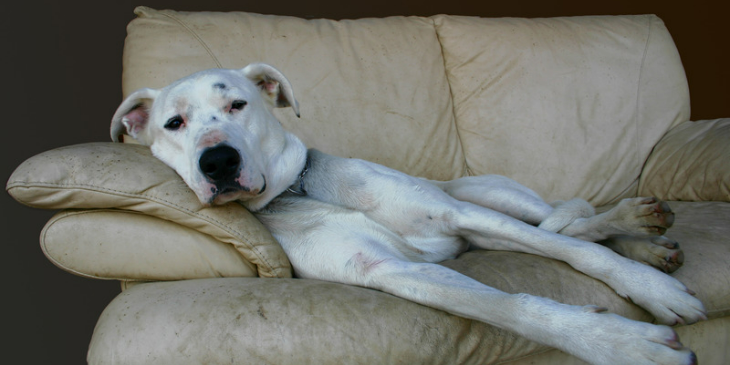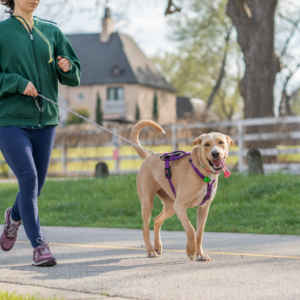Do Dogs Gain Weight After Neutering?

Contents
As responsible pet owners, we want to ensure that our furry friends are in the best of health. Neutering is one of the most common procedures performed on dogs. And while it can have many benefits, such as reducing the risk of certain diseases and behaviors, many dog owners are concerned about the possibility of their dog gaining weight after neutering.
In this post, we will explore whether dogs gain weight after neutering and why this might happen. We’ll also look at some tips and strategies to help prevent excessive weight gain in neutered dogs. So, if you’re a dog owner who has recently had your pup neutered or is considering the procedure, this post is for you. Let’s dig in!
Is Weight Gain in Dogs Common After Neutering?
The answer to this question isn’t a straightforward yes or no. While some dogs do experience weight gain after neutering, others do not. The likelihood of weight gain depends on various factors, including the dog’s breed, age, and activity level, as well as their diet and lifestyle.
According to a study published by the Journal of the American Veterinary Medical Association, neutered dogs are at a higher risk of becoming overweight or obese compared to intact dogs. The study found that neutered male dogs had a 3.4 times greater risk of becoming overweight, while spayed female dogs had a 1.6 times greater risk.
So, while it’s somewhat common, weight gain after neutering certainly isn’t guaranteed. Let’s explore the reasons why some neutered dogs may gain weight, what the risks are, and what steps dog owners can take to prevent it.
Why Do Dogs Gain Weight After Neutering?
The physiological and metabolic changes that occur after neutering can increase a dog’s risk of gaining weight.
How Neutering Affects a Dog’s Physiology
Neutering can affect a dog’s physiology in several ways that may contribute to weight gain, Wen a male dog is neutered, his testicles are removed, which results in a decrease in testosterone levels.
Testosterone is a hormone that helps regulate metabolism and muscle mass. When testosterone levels drop, a dog’s metabolic rate may decrease, and its body composition may change, resulting in increased fat storage. This can also result in a decrease in energy expenditure, making it easier for the dog to gain weight if they continue to eat the same amount of food.
Metabolic Changes That Occur After Neutering
Neutering can also lead to metabolic changes that may contribute to weight gain. For example, after neutering, a dog’s body may become less efficient at burning calories, which means they need fewer calories to maintain their weight. If a pet owner continues to feed their dog the same amount of food after neutering, the excess calories are likely to be stored as fat.
Additionally, neutered dogs may experience changes in their behavior that can affect their weight. For example, neutering can reduce a dog’s activity level, making them less likely to burn calories. Furthermore, neutered dogs may experience changes in their appetite and food intake, which can also contribute to weight gain.
Factors That Contribute to Weight Gain After Neutering
Now that you know how neutering can affect your dog’s physiology and metabolism, let’s take a closer look at some of the factors that can contribute to weight gain after the procedure.
Alterations in Appetite and Eating Behavior
Neutered dogs may experience changes in their appetite and eating behavior, which can contribute to weight gain. Some dogs may become less interested in food after the procedures, while others may experience an increase in appetite. Some dogs even develop a preference for high-calorie foods.
Decreased Energy Expenditure
Neutered dogs may also have decreased energy expenditure, meaning they burn fewer calories throughout the day. They can occur due to a decrease in physical activity levels or a reduction in the dog’s metabolic rate.
Changes in Hormones
Neutering can lead to changes in hormone levels, which can affect both the dog’s metabolism and body composition. Lower testosterone levels in male dogs can lead to increased fat storage, decreased muscle mass, and a decrease in energy expenditure.
Breed and Size of Dog
Finally, a dog’s breed and size can influence their risk of weight gain after neutering. Some breeds, such as Golden Retrievers and Beagles, are more prone to obesity, regardless of whether they have been neutered. Additionally, larger dogs have a lower metabolic rate and require fewer calories per pound than smaller dogs.
Risks Associated with Weight Gain After Neutering
Weight in dogs, whether or not it is related to neutering, can have serious health consequences. However, when weight gain is a direct result of neutering, it’s important for pet owners to be aware of the potential risks and take steps to manage their dog’s weight.
Health Consequences for Overweight Dogs
Overweight and obese dogs are at a higher risk of health problems, including diabetes, heart disease, joint problems, and respiratory issues. These health problems can significantly impact a dog’s quality of life and require ongoing management and treatment.
Common Diseases Associated with Canine Obesity
Some of the most common diseases associated with canine obesity include:
- Diabetes: Excess weight can cause the body to become less responsive to insulin, which can lead to diabetes.
- Heart Disease: Overweight dogs are at a higher risk of heart disease, including high blood pressure and heart failure.
- Joint Problems: Extra weight puts additional stress on a dog’s joints, which can lead to joint problems, such as arthritis.
- Respiratory Issues: Overweight dogs may have difficulty breathing due to the additional weight pressing on their chest and lungs.
Negative Impact on Dog’s Lifespan
In addition to the higher risk of disease, overweight dogs may also have a shorter lifespan. According to a study by the University of Liverpool, dogs that were overweight at six years of age had a shorter lifespan than dogs that were at a healthy weight.
How to Prevent Weight Gain After Neutering

Increasing your dog’s exercise and physical activity can help prevent weight gain after neutering.
The good news is, there are steps you can to manage your neutered dog’s weight and prevent potential health issues. Here are some tips and strategies that can help.
Adopting a Healthier Diet Plan
One of the most important steps you can take to prevent weight gain in your neutered dog is to adopt a healthier diet plan. This may include switching to a higher quality dog food that is lower in fat and calories, as well as reducing the amount of treats and table scraps that your dog receives.
Increasing Exercise and Physical Activity
In addition to adopting a healthier diet, increasing your dog’s exercise and physical activity can also help prevent weight gain. This may include going for daily walks, playing fetch and other interactive games, and providing your dog with plenty of opportunities for exercise and play.
Monitoring Your Dog’s Weight and Body Condition
Finally, it’s important to regularly monitor your dog’s weight and body condition to ensure that they are staying within a healthy range.
Your veterinarian can help you determine the appropriate weight range for your dog based on their breed and size and can provide guidance on how to assess your dog’s body condition. Regular weigh-ins at the vet’s office can also help you track your dog’s progress and identify problematic weight gain early on.
Wrapping Up
While weight gain after neutering is somewhat common, it’s not inevitable. By understanding the factors that contribute to weight gain and taking steps to prevent it, dog owners can help ensure that their neutered dogs stay healthy and happy.
If you have any concerns about your neutered dog’s weight, it’s important to talk with your veterinarian. They can provide guidance on weight management strategies, as well as other steps you can take to promote your dog’s overall well-being.
In conclusion, while weight gain after neutering can be a concern for pet owners, it’s important to remember that with the right approach, it’s a manageable issue. By staging informed and taking proactive steps to promote their dog’s health and wellness, pet owners can help their neutered dogs live happy, healthy lives.
